The European DX Council, DXing and geocaching
Hello, DXers and radio listeners across the spectrum!

Between September 8-10, 2023, Metz, France, became the hub for shortwave listening enthusiasts and radio amateurs at the 2023 European DX Council (EDXC) conference. That unforgettable rendezvous was more than just an event. It was a congregation celebrating the joys of Medium Wave, Long Wave (LW), Shortwave, and the broader world of international broadcasting.
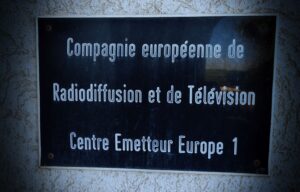
Our journey took us to the renowned Europe 1 Sender (transmitter) in Uberherrn (Felsberg), followed by engaging conversations among fellow DXers at a local cafè right on the border between France and Germany. The culmination involved a festive evening banquet at a typical Brasserie in Metz, celebrating the spirit of DXing and radio listening.
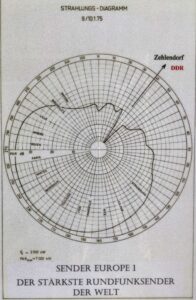
An interesting correlation between DXing and Geocaching emerged during a lively conversation at the tail end of the EDXC conference in Metz, also concerning an open debate on how to get more young people interested in the hobby of DXing, and, in general, Medium Wave (MW), Long Wave (LW) and Shortwave radio listening. Would this be a way to promote DXing to a larger public and introduce our hobby to a younger audience?
Read on for more details …
What is DXing?
DXing is a hobby centred on receiving, identifying, and collecting distant radio or television signals. The term “DX” is derived from the telegraphic shorthand for “distance” or “distant.” DXers, the enthusiasts who engage in this hobby, use various equipment and techniques to catch transmissions from faraway places.
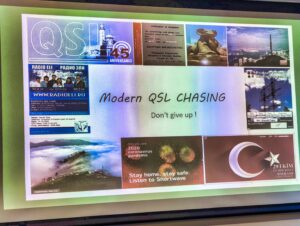
Key points about DXing
- Modes of Transmission: DXing can involve several modes of transmission, including AM radio, shortwave (SW) radio, FM radio, television, and even satellite signals.
- Challenges: A significant aspect of the fun and challenge of DXing is tuning into distant stations that are weak or are subject to interference, often requiring keen ears and specialised equipment.
- Equipment: While many DXers use regular commercial radio sets, others might employ more specialised equipment like single sideband receivers, external antennas, preselectors, and Software Defined Radios (SDRs) to maximise their reception capabilities.
- Awards and Recognition: Various clubs and organisations dedicated to DXing often issue awards and certificates for notable reception accomplishments, such as logging a certain number of countries or specific distant stations.
- Types: While the most common form is shortwave DXing, other forms include FM DXing, where enthusiasts try to receive distant FM radio stations, and TV DXing, centred on receiving distant television signals.
- Applications: Beyond being a hobby, DXing skills have been valuable in intelligence and during wars, where operatives would tune into foreign broadcasts to gather information.
DXing is a blend of art, science, and patience. It serves both as an enjoyable pastime for many and a testament to the marvel of radio waves and their ability to connect people across vast distances.
QSL Cards
A QSL card is a written confirmation of two-way radio communication between two amateur radio stations or a one-way reception of a signal from an AM radio, FM radio, television, or shortwave broadcasting station. The term “QSL” comes from the Q code, a set of standardized radio shorthand codes that originated with Morse code operators. “QSL?” asks “Did you receive my transmission?” while “QSL” alone means “I confirm receipt of your transmission.”
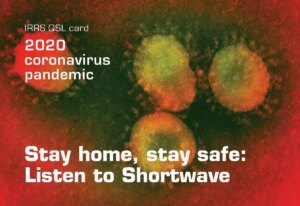
The Importance of Collecting QSL Cards for DXers
- Proof of Reception: For DXers, particularly those who engage in long-distance radio listening, a QSL card is a tangible confirmation that they successfully received a signal from a distant station. It’s akin to a trophy or badge of achievement in the DXing world.
- Historical Record: QSL cards often provide details of a particular broadcast or contact’s date, time, frequency, and signal strength. Over time, these cards become a historical record of one’s listening or contacting achievements.
- Cultural Exchange: Many QSL cards are beautifully designed, featuring images or artwork that provide insights into the culture, geography, or history of the broadcasting nation or the individual radio operator. Thus, collecting these cards can offer a rich cultural and visual journey worldwide.
- Competition & Awards: Within the DXing community, there are often competitions and awards based on who can confirm reception from most countries, regions, or specific challenging stations. QSL cards serve as the evidence required to claim such achievements.
- Personal Connection: For amateur radio operators, exchanging QSL cards is not just about confirming a radio contact. It’s also a personal touch, connecting two individuals who might be thousands of miles apart. The card is a remembrance of that connection.
- Encouragement for Stations: When broadcasting stations, significantly smaller or lesser-known, receive QSL card requests, it serves as positive feedback. It lets them know that their signals are reaching distant places and that there are listeners who appreciate their content.
While the digital age might offer various online tools and software for logging and confirming radio contacts, QSL cards retain a charm and personal touch that makes them a cherished tradition in DXing.
DXing Meets Geocaching: The Digital Era of Discovery
At first glance, DXing and geocaching are distinct realms. Still, a closer look reveals a shared spirit: the exhilaration of exploration and the reward of discovery. Just as geocaching enthusiasts use GPS to hunt for hidden treasures worldwide, DXers scan the airwaves in search of elusive radio signals from remote corners of the globe. The thrill here isn’t just in the hunt but also the tools of the trade. To dive into DXing, all you traditionally needed was a radio receiver. However, today’s digital age has revolutionised the hobby. Now, enthusiasts can connect online to hundreds of remote (online) SDR (Software Defined Radios) receivers that grant free access to the vast spectrum of Medium, Long, and Shortwave frequencies worldwide.
This melding of technology and adventure mirrors geocaching’s appeal, making DXing even more accessible and engaging for young people. As the world becomes increasingly interconnected, these hobbies offer them an opportunity to explore global communities, appreciate the wonders of radio technology, and embrace the joy of unearthing hidden wonders, whether physical caches or ethereal radio waves.
What is the European DX Council (EDXC)?
For newcomers to the EDXC, this nonprofit organisation is not just a Council; it’s a global nexus for those passionate about DXing.
The EDXC’s fundamental aspirations are:
- Upholding the DXers’ Spirit: Advocating for DX listeners and allied radio clubs in the expansive international broadcasting and telecommunications universe.
- Global Collaboration in Radio: Enlarging our footprint beyond Europe, weaving together a network of DX enthusiasts and radio organisations worldwide.
- Educational Symposia: EDXC annual conferences illuminate the ever-evolving facets of radio and shortwave listening.
- Networking Bridge: Facilitating dialogue between DX listeners, radio clubs, radio stations, and critical stakeholders in radio and telecommunications.
- Elevating the DX Passion: Keeping the enchantment of DXing alive and thriving for future generations of radio listeners.
Membership to the EDXC
Membership to the EDXC is entirely free. Whether you’re a Shortwave listener from Tokyo’s bustling streets, a radio amateur soaking up the sun on Brazil’s tranquil shores, or an avid listener from anywhere else, or are puzzled about understanding how to catch distant stations, we strongly invite you to join the EDXC council or a local or national member organisation as a personal member or join as a local club of DXers.
Becoming part of the EDXC immerses you in a community of passionate radio listeners and DXers. If the melodies and mysteries of radio frequencies captivate your evenings, consider this your exclusive invite to connect with peers who resonate with your passion.
EDXC’s Annual Conferences
Each year, the European DX Council (EDXC) holds a riveting conference that serves as a melting pot of ideas, discussions, and camaraderie for radio enthusiasts from around the globe. These gatherings are not just about radio; they celebrate a shared passion, an opportunity to connect with like-minded souls, and a deep dive into the ever-evolving world of radio listening and DXing.
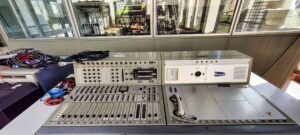
The next EDXC conference is set to grace the picturesque city of Tartu, Estonia, in the late summer of 2024. Nestled along the Emajõgi River, Tartu is Estonia’s intellectual heartland, renowned for its venerable university and vibrant cultural scene. Its historic charm and modern vibrancy provide the perfect backdrop for engaging sessions and delightful explorations.
Whether you’re a seasoned DXer or a curious novice, Tartu’s inviting ambience and EDXC’s enriching agenda promise an event you won’t miss. Join the European DX Council as we tune into the future of radio amidst the enchanting lanes of Tartu.
For additional details, insights, and updates, visit the official European DX Council (EDXC) website.
To apply for membership to the EDXC, please contact the EDXC Secretary General or apply for membership at one of the many diferent DX clubs & organisations.
Special thanks to Christian Ghibaudo, Assistant Secretary General at the EDXC, for making this year’s conference in Metz such a memorable experience for all of us!

0 Comments